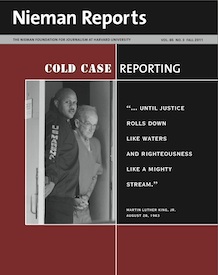Editor’s Note: Our sister publication Nieman Reports is out with their Fall 2011 issue, “Cold Case Reporting,” which focuses on process of revisiting old investigations to tell new stories. Over the next few days, we’ll highlight a few stories from the issue — but go read the whole thing. In this piece, Robert J. Rosenthal of the Center for Investigative Reporting writes about the origins of the Civil Rights Cold Case Project.
Soon after I arrived at the Center for Investigative Reporting (CIR) in January 2008, I spoke with reporter John Fleming of The Anniston (Ala.) Star. He was looking for help investigating a cold murder case from the civil rights era. Within weeks I learned of other journalists in the South and elsewhere who were working on similar cases. Two of them, Jerry Mitchell of The Clarion-Ledger in Mississippi and Canadian documentary filmmaker David Ridgen, had done acclaimed work that helped bring killers to justice and some small measure of peace to the families of the victims.
 In the early spring of 2008 I traveled to Jackson, Mississippi to talk about collaboration and the funding of cold case reporting with Mitchell; Ridgen; Fleming; Stanley Nelson of the Concordia Sentinel, a weekly paper in Ferriday, Louisiana; and Aynsley Vogel of the Vancouver-based Paperny Films. Our unifying motivation was storytelling, justice and even reconciliation. I wanted to create a project of an ambitious sweep that would tell the untold stories of killers, victims and their families in ways that would tie together a shameful chapter in American history and link it in powerful arcs to today. What I didn’t know going in was how inspired I’d feel by hearing these journalists share fragments from their work that spoke to why telling these stories mattered to them — and should matter to all of us.
In the early spring of 2008 I traveled to Jackson, Mississippi to talk about collaboration and the funding of cold case reporting with Mitchell; Ridgen; Fleming; Stanley Nelson of the Concordia Sentinel, a weekly paper in Ferriday, Louisiana; and Aynsley Vogel of the Vancouver-based Paperny Films. Our unifying motivation was storytelling, justice and even reconciliation. I wanted to create a project of an ambitious sweep that would tell the untold stories of killers, victims and their families in ways that would tie together a shameful chapter in American history and link it in powerful arcs to today. What I didn’t know going in was how inspired I’d feel by hearing these journalists share fragments from their work that spoke to why telling these stories mattered to them — and should matter to all of us.